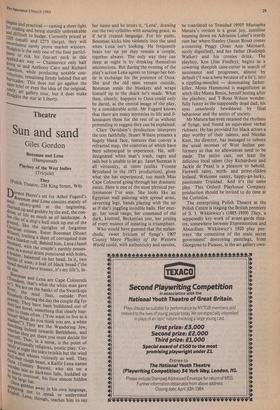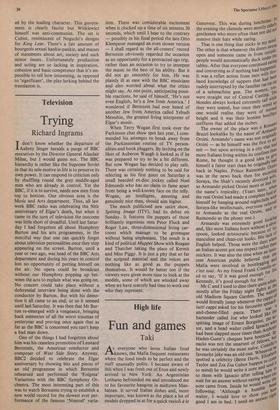Theatre
Sun and sand
Giles Gordon
Boesman and Lena (Hampstead) Playboy of the West Indies (Tricycle) (Polish They
Theatre, 238 King Street, W6) Dermot Hayes's set for Athol Fugard's Boesman and Lena consists mainly of
sand: silver
churned_ at the beginning, churned-up and grubby by the end, the con- ci,ition of life as much as of landscape. A iew ribs of a ship's hull stick up out of the gr°bnd, like the uprights of forgotten Christi an crosses. Enter Boesman (Stuart ilsorl), trailing a sheet of corrugated iron a,nd a blanket roll. Behind him, Lena (Janet .Lizrrian), with the couple's earthly posses- 11°,11s in a metal drum punctured with holes, posses- s urazier balanced on her head. In it, two kettles of wine, a loaf of black bread `the ureadsave bruises, Ile els ehould have bruises, my life'), lit- (Tikieslilan and Lena are Cape Coloureds ,reedorn, that's what the white man gave uks. )• We are on the banks of the Swartkops Lii.ver, the mud flats, outside Port Eliza the
During the day the couple dig for
Drawn, h I heY have been bulldozed out of tj.eir last hovel, something that clearly hap- iPieons to them often. (`You want to live in a rh,u,se? What do you think you are, a white —quarn) They are the Wandering Jew, slotich•
mg indeed towards Bethlehem, and
yourself they get there you must decide for this prof That, in a sense, is the point of ta"i'siDrofoundly religious, poetic play. Cer- horimY at flight the stars twinkle but the wind find's and whines viciously as well. They ,u their rough beast, a Kaffir Lena names wu,ota de„ box Buson), who sits on a to c)b uox as darkness falls, huddled up
by overcoat, his face almost hidden
is large hat. gala gabbles awaysp in eak his or undegr own lan stuageand
,
flr-:ng not to
61Ish. ena, though, teaches him to say her name and he utters it, `Lena', drawing out the two syllables with amazing grace, as if he'd created language. For his pains, Boesman kicks him violently into the sand when Lena isn't looking. He frequently beats her up yet they remain a couple, together always. The only way they can sleep at night is by drinking themselves unconscious. But during the evening of the play's action Lena agrees to forego her bot- tle in exchange for the presence of Outa. She and the old man remain outside, Boesman steals the blankets and wraps himself up in the shack he's made. What then, silently, happens to Outa could only be dared, as the central image of the play, by a considerable artist. Mr Fugard knows that there are many mysteries to life and il- luminates them for the rest of us without pretending to suggest they can be explained.
Clare Davidson's production interprets the text faithfully. Stuart Wilson presents a hugely blank face, features that convey a refracted map, the countries of which have been submerged in experience. He, self- designated white man's trash, rages and rails but is unable to let go. Janet Suzman is all virtuosity, at times (unlike Yvonne Bryceland in the 1971 production), given what she has experienced, too much Miss Cape Coloured going through her dramatic paces. Here is one of the most physical per- formances I've seen. She looks like an Egyptian wall painting with spread arms, cavorting legs, hands playing with the air as if she's juggling invisible balls. Her ener- gy, her vocal range, her command of the dark, knotted, Beckettian text, her prising of every nuance of meaning is triumphant.
Who would have guessed that the melan- cholic, sweet lyricism of Synge's 1907 County Mayo Playboy of the Western World could, with authenticity and success,
be translated to Trinidad 1950? Mustapha Matura's version is a great joy, sunshine beaming down on Adrianne Lobel's sturdy rum bar where Stanley (Jason Rose) comes a-courting Peggy (Joan Ann Maynard, nicely dignified), and her father (Rudolph Walker) and his cronies drink. The playboy, Ken (Jim Findley), begins as a cowering sheepish cane-cutter in search of sustenance and progresses, almost by default (`I was a hero because of a lie'), into a rippling-muscled — dominating father- killer. Mona Hammond is magnificent as witch-like Mama Benin, herself lusting after the playboy, and T-Bone Wilson wonder- fully funny as the supposedly dead dad, his eyes ceaselessly bewildered by filial behaviour and the antics of society.
Mr Matura has even retained the rhythms of Synge, and found an equivalent verbal richness. He has provided for black actors a play worthy of their talents, and Nicolas Kent, the director, has managed to suborn the usual excesses of West Indian per- formers so that no allowances need to be made. The entire cast, not least the delicious local talent (Joy Richardson and Jackie de Peza) is a pleasure to behold. Farewell rainy, myth- and priest-ridden Ireland. Welcome sunny, happy-go-lucky, passionate Trinidad. And it's the same play. This Oxford Playhouse Company production should be invited to do time at the Cottesloe.
The enterprising Polish Theatre at the Polish Centre is staging the British premiere of S. I. Witkiewicz's (1885-1939) They, a supposedly key work of avant-garde thea- tre, somewhere between Expressionism and Absurdism. Witkiewicz's 1920 play por- trays `the committee of the main secret government' destroying paintings, from Giorgione to Picasso, in the art gallery own- ed by the leading character. This govern- ment is clearly fascist but Witkiewicz himself was anti-communist. The set is Cubist, reminiscent of Noguchi's designs for King Lear. There's a fair amount of bourgeois sexual hankie-pankie, and masses of statements about art, society and such minor issues. Unfortunately production and acting are so lacking in inspiration, cohesion and basic competence that it's im- possible to tell how interesting, as opposed to 'significant', the play lurking behind the translation is.











































 Previous page
Previous page